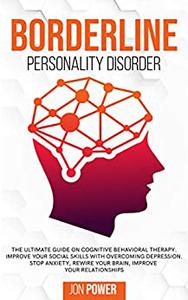
Borderline Personality Disorder: The Ultimate Guide on Cognitive Behavioral Therapy. Improve Your Social Skills with Overcoming Depression. Stop Anxiety, Rewire Your Brain, Improve Your Relationships by Jon Power
English | 2022 | ISBN: 1914020170 | 160 pages | EPUB | 0.27 Mb
Would you like to know what BPD is? Then Keep reading...
BPD is also referred to as biosocial disorder among experts. This means that this disorder often starts with an inclination towards biological factors but is then intensified by the social environment of an individual.
By temperament, the people with BPD often are intensely emotionally sensitive and very reactive. This is because they tend to feel things immediately and intensely as opposed to other people. Once their powerful and intense emotions have been triggered, it takes them a very long duration to get back to the emotional baseline.
It is important to note that when these emotionally vulnerable people are confronted by their surroundings because they cannot validate their feelings, they develop BPD. In other words, they feel as though the people around them do not fully understand and acknowledge them as they are enough to help them handle their condition. In most cases, children who develop BPD have been shown to suffer abuse and neglect. Additionally, BPD also arises in children whose parents or guardians - well-meaning and loving - reduce their emotional feelings too much because they think that they are inappropriate or exaggerated.
This book covers the following topics:
What is borderline personality disorder?
Symptoms of Borderline Personality Disorder
Using mindfulness to manage emotions
Epidemiology, Factors of Borderline Personality Disorder
Diagnosis of the Disorder
Treatment and Medication
Practicing Mindfulness
Building a Coping Skills Toolkit.
How to improve social relationships
How to End Anxiety
What Does It Mean to Rewire Your Brain?
How to Overcome Panic Thoughts
To be fair, it is typical for most parents to overreact and dismiss their children's emotional feelings. However, when it comes to children who are highly reactive, feeling that they are not understood or supported by the people that mean the world to them often is painful. It is this kind of response that often cause them to withdraw from their parents to the level that their relationship is completely disconnected.
One thing that is important to note is that when a child's feelings are not validated by their parents or someone that they look up to in life, it makes it hard for them to learn how to manage their condition in a very healthy way. The truth is that, it is the adult's/parent's responsibility to help their children identify and name their feelings. When they soothe what their children feel, they teach them how to soothe and calm themselves down better whenever they are alone.
Let us consider an instance where someone has intensely strong emotions and is constantly overreacting. Is this how they should feel on a daily basis? Well, this is no way for anyone to feel this way. But when they don't get the support they need; this kind of reaction becomes something ongoing that they don't even know how to regulate or modulate their emotional feelings.
What you will note about people with BPD is that they are often overwhelmed by feelings of intense anger, emptiness, self-loathing, shame, and abandonment among others. It is these kinds of feelings that causes their relationships to be quite unstable - hence causing them to be prone to interpreting things negatively.
Links are Interchangeable - No Password - Single Extraction



